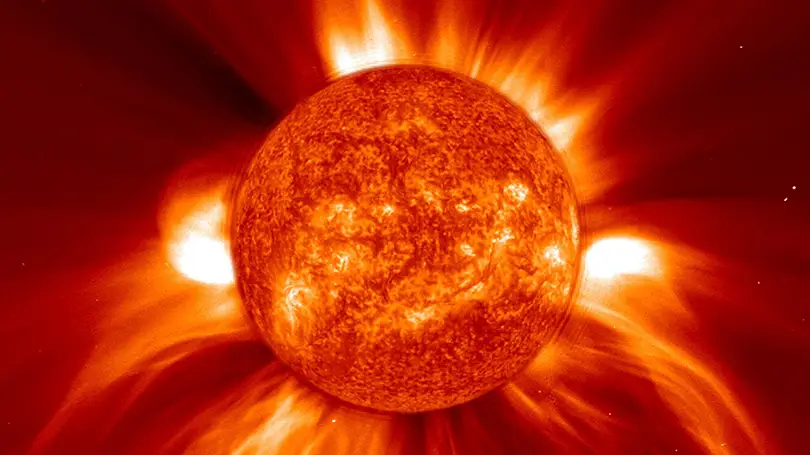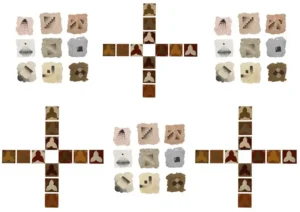If you wake up this Friday feeling off — a little dizzy, anxious, or strangely tired — it may not be the coffee you skipped or the headlines you scrolled through before dawn.

It might be the Sun.
On November 7, our star is sending another pulse toward Earth — a stream of charged solar particles that will hit the planet’s magnetic field with the force of a storm.
Space scientists call it a geomagnetic disturbance, rated between 4 and 6 on the Kp scale — strong enough to make Earth’s magnetic shell tremble, satellites flicker, and, yes, for some people to feel it in their own blood and breath.
The Unseen Weather Above Us
We talk about weather every day — hot, cold, windy, dry — but there’s another kind of weather we can’t see: space weather.
It begins 93 million miles away, on the roiling surface of the Sun, where loops of plasma twist and break, throwing out clouds of energy the size of planets.
When one of those clouds is aimed at Earth, it takes only a few days to arrive. The impact is silent but powerful. Our magnetic field, the invisible shield that keeps cosmic radiation at bay, ripples like a drum.
For a few hours, the entire planet hums differently.
That hum can reach us — in ways both mysterious and measurable.
The Body as a Compass
Doctors and researchers have noticed something remarkable: when the magnetic field shifts, some people feel it before instruments do.
Hospitals report small spikes in headaches, pressure swings, insomnia, and anxiety during geomagnetic storms.
It’s not imagination. The human heart and brain both rely on electrical rhythms that respond to external magnetic changes.
NASA scientists refer to this effect as bioelectrical stress. It’s not dangerous, but it can unbalance people who are already under pressure — especially those sensitive to shifts in light, sound, or weather.
Imagine your body as a compass. Normally, it points north — steady, centered. A solar storm is like a sudden twist of the needle. You still function, but the direction feels slightly off.
A Storm, and a Reminder
This particular storm began with an M-class solar flare on November 4.
It hurled a surge of plasma into space, and by Friday, the wave will reach Earth. NOAA’s forecasts show magnetic levels peaking in the evening — enough to trigger northern auroras and small disturbances in communications and GPS systems.
In California, we won’t see the shimmering lights. But we’ll still be inside the field — every tree, every wire, every pulse of electricity inside us vibrating just a fraction differently.
What You Might Feel
Most people won’t notice anything unusual.
A few will.
- A dull headache that comes and goes.
- A night of restless sleep.
- A rush of energy that feels like nervous excitement.
- Or, sometimes, a deep calm — the way the air feels before a storm on Earth.
Physiologists say it’s not harmful; it’s simply your nervous system adjusting. The key is to move slower, breathe deeper, and let your body find its rhythm again.
Drink water. Avoid too much caffeine. Get a little extra rest.
And if you’ve got a heart condition or blood pressure issues, keep your medication schedule steady — your body’s compass depends on consistency.
When Space Touches Earth
For engineers, magnetic storms are a reminder of how fragile our modern world is.
Satellites, navigation systems, power grids — all depend on stable electromagnetic fields. A solar storm shakes that balance, even for a few hours.
But for the rest of us, the reminder is more personal: we live in a connected universe. The same forces that ignite the Sun’s surface brush against our atmosphere, flow through our oceans, and whisper through our cells.
We don’t just orbit the Sun — we listen to it, whether we realize it or not.
The Human Side of Space Weather
In a state like California, where science meets spirituality and technology meets wellness, this kind of story resonates deeply.
We measure the health of the planet in data, but we feel it in our own rhythms — when we can’t sleep, when our thoughts race, when something in the air feels charged.
The Sun isn’t angry. It’s just alive — burning, pulsing, breathing energy across space.
And on days like November 7, we remember that so are we.
A Simple Thought for Friday
If the world feels strange this week — if your mood shifts, if your sleep is restless, if you find yourself staring at the sky for no reason — take it as a quiet nudge from 93 million miles away.
Slow down. Breathe. You’re part of a system far bigger than your to-do list.
The Sun is speaking a little louder today.
And somehow, your body understands.

















